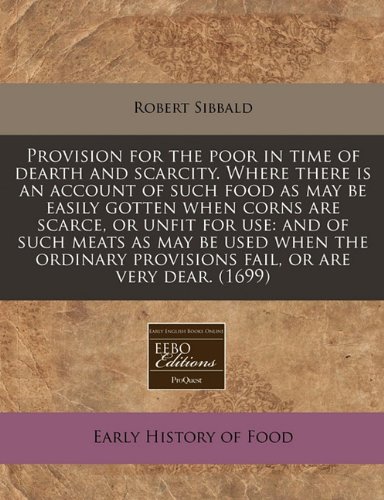Background
He was born in Edinburgh, the son of David Sibbald (brother of Sir James Sibbald) and Margaret Boyd (January 1606 – 10 July 1672).



(EARLY HISTORY OF FOOD. Imagine holding history in your ha...)
EARLY HISTORY OF FOOD. Imagine holding history in your hands. Now you can. Digitally preserved and previously accessible only through libraries as Early English Books Online, this rare material is now available in single print editions. Thousands of books written between 1475 and 1700 can be delivered to your doorstep in individual volumes of high quality historical reproductions. This collection ...
http://www.amazon.com/gp/product/B00EQFENLW/?tag=2022091-20

( EARLY HISTORY OF FOOD. Imagine holding history in your ...)
EARLY HISTORY OF FOOD. Imagine holding history in your hands. Now you can. Digitally preserved and previously accessible only through libraries as Early English Books Online, this rare material is now available in single print editions. Thousands of books written between 1475 and 1700 can be delivered to your doorstep in individual volumes of high quality historical reproductions. This collection combines the commercial aspects of food handling, preservation and supply to the more specific aspects of canning and preserving, meat carving, brewing beer and even candy-making with fruits and flowers, with a large resource of cookery and recipe books. ++++ The below data was compiled from various identification fields in the bibliographic record of this title. This data is provided as an additional tool in helping to insure edition identification: ++++ Provision for the poor in time of dearth and scarcity. Where there is an account of such food as may be easily gotten when corns are scarce, or unfit for use: and of such meats as may be used when the ordinary provisions fail, or are very dear. Sibbald, Robert, Sir, 1641-1722. Attributed to Robert Sibbald by Wing. Includes bibliographical references. 24 p. Edinburgh, : Printed by James Watson, Wing (2nd ed.), / S3726A English Reproduction of the original in the University of Glasgow Library ++++ This book represents an authentic reproduction of the text as printed by the original publisher. While we have attempted to accurately maintain the integrity of the original work, there are sometimes problems with the original work or the micro-film from which the books were digitized. This can result in errors in reproduction. Possible imperfections include missing and blurred pages, poor pictures, markings and other reproduction issues beyond our control. Because this work is culturally important, we have made it available as part of our commitment to protecting, preserving and promoting the world's literature.
http://www.amazon.com/gp/product/1240935099/?tag=2022091-20
geographer naturalist physician university professor
He was born in Edinburgh, the son of David Sibbald (brother of Sir James Sibbald) and Margaret Boyd (January 1606 – 10 July 1672).
University of Edinburgh. University of Paris; Leiden University. Royal High School.
Educated at the Royal High School and the Universities of , Leiden, and Paris, he took his doctor's degree at the University of Angers in 1662, and soon afterwards settled as a physician working in. He resided at "Kipps Castle" near Linlithgow. In 1667 with Sir Andrew Balfour he started the botanical garden in , and he took a leading part in establishing the Royal College of Physicians of , of which he was elected president in 1684.
In 1685 he was appointed the first professor of medicine at the University of. He was also appointed Geographer Royal in 1682, and his numerous and miscellaneous writings deal with historical and antiquarian as well as with botanical and medical subjects. He based many of his cartographical studies on the work of Timothy Pont.
He is buried in Greyfriars Kirkyard in in a vault against the southern wall. The wild flower Sibbaldia procumbens is named after him. Originally the blue whale was named after Sibbald, who first described it scientifically.
Although the blue whale is today usually classified as one of eight species in the genus Balaenoptera, one authority still places it in a separate monotypic genus, Sibbaldus, but this is not widely accepted. The blue whale was once commonly referred to as Sibbald's rorqual.
(EARLY HISTORY OF FOOD. Imagine holding history in your ha...)
( EARLY HISTORY OF FOOD. Imagine holding history in your ...)
Royal College of Physicians of Edinburgh.
